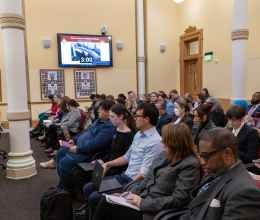
I am horrified by the killing of police officers Wenjian Liu and Rafael Ramos in New York City. I grieve for their families, and I sympathize with the outrage of the law enforcement community. At the same time, I remain horrified by the killing of Eric Garner and other victims of police violence. I grieve for their families, and I sympathize with the outrage of protesters. Are these sentiments contradictory? I don’t think so.
The violent death of any person in our society is tragic, no matter what that person’s race or position may be. No matter what a family looks like, the violent loss of a loved one causes anguish and anger. When a whole community feels under attack, communal outrage is to be expected.
To prevent escalating cycles of violence and revenge, our laws and constitutional principles are supposed to seek accountability with due process, without cruel or unusual punishment, and with equal protection for all. When those systems fail to provide justice equally applied, there are constitutionally-protected outlets for protest through free speech, the right of assembly, and the right to petition for redress of grievances.
These rights of protest are being exercised by thousands of people who see or suffer from widespread injustice through racial bias in our criminal justice system and excessive use of force with impunity by law enforcement. The problem is real--the stories and statistics do not lie. Colorado is not exempt from these problems, and the resulting anger should not be a surprise.
Now a man who apparently shot his girlfriend in Baltimore and threatened online to kill police has gone on to ambush and murder officers Liu and Ramos in New York before killing himself. He did not act at the behest of those protesting injustice and he certainly did not listen to the family of Eric Garner, who could not have been clearer in calling for nonviolent response.
New York law enforcement had the option of helping de-escalate violence by making clear that nonviolent protesters were not to blame for this horrific killing, but instead, in their anger, some police representatives placed blame for the deaths on protesters and any politicians willing to listen to those protesters.
The last thing our nation needs is an escalating war between police and the communities they are supposed to serve and protect. We have already moved too far down the road of police militarization. Even more aggressive policing with impunity for police violence will only make everyone less safe and put more of our civil liberties in danger.
We should also be skeptical of inflammatory stories in the media. Protests on the ground in Ferguson, Missouri, led primarily by women of color, have been overwhelmingly peaceful over a long period of time, but no one would have that impression from most media coverage of Ferguson. Locally in Denver, you might have thought from media headlines that East High School protesters caused the injuries of officer John Adsit when that was not the case. In fact, East students and their families have raised over $10,000 for the Adsit family, wishing for his recovery. At the ACLU, we share in that wish.
Everyone has a role in de-escalating violence, which is why de-escalation skills are a part of ACLU Know Your Rights trainings for police encounters or protests. These are good skills for anyone to know, but in the case of law enforcement, knowing how to manage anger and de-escalate violence is not just a good idea, it is a professional responsibility. As carriers of government power, police are bound by the constitution and by their oaths and codes of ethics. Police officers do have difficult jobs, and honoring these codes is part of the challenge. With respect to accountability under the law, recognizing and overcoming bias, preventing violence and acting with respect even if faced with disrespect, law enforcement should be held to a higher standard, not a lower one.
In response to student protests locally, a conversation on race was begun by Denver Mayor Hancock at the Colorado History Center on December 19. There was not room for all the people who wanted to be present. The session barely touched upon some core issues of police accountability, but it will prove valuable if it begins a path toward real education and real reform. A deeper conversation was held in the same space the next day at a community-led discussion on Black Lives and White Allies. What is clear is that these issues are not going away and there is much work to be done. I commend those in Colorado law enforcement who are reaching out to black leaders and youth of color. Some have reached out to the ACLU as well. In the face of loss of life and tragedy, we have a choice of withdrawing and resisting change, or of coming together and doing the tough work of reform. Only the latter will save lives in the long run.
